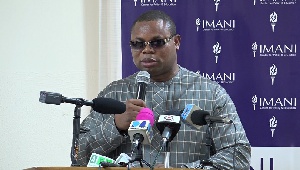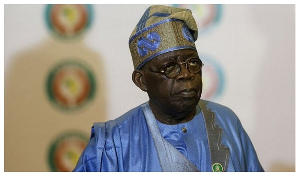The current famine spreading across the Horn of Africa has again focused the world’s attention on the massive challenge the world faces to ensure food security for the people of the planet. The world lived through a massive food crisis in 2007 / 08, and is in the middle of an even worse crisis. Under such circumstances there is no place or space for politicians who use agriculture as a political toy for personal gain.
Food Security Ghana (FSG) has been following issues on agricultural development in Ghana for quite some time, and there is none as controversial as the issue of rice.
Very recently Dr. Mamaa Entsua Mensah, Deputy Director General of the Council for Scientific and Industrial Research (CSIR) in Ghana, said that he rice industry in Ghana has seen unprecedented increase in consumption levels over the past decade with significant proportion of consumers switching from consumption of other staples to rice.
At the “Africa Rice Project” inception workshop by the Canadian International Development Agency (CIDA) Dr. Mensah also quoted the following facts about rice in Ghana:
*
* About 70 per cent of rice consumed in Ghana is imported and these importations had been consistently high since 2001; *
* Despite the efforts made in local rice production the cost of production was high and uncompetitive in the domestic market; *
* There is a significant quality gap between locally produced and imported rice due to:
o cost of inputs,
o poor post-harvest handling,
o lack of access to improved processing technologies, and
o marketing challenges.
Other facts about rice in Ghana indicate that promises by the Ministry of Food and Agriculture (MOFA) that Ghana will be self sufficient in rice production by 2015 may just be a typical example of using agriculture for political gain.
A study published by USAID and prepared by Olaf Kula and Emmanuel Dormon of ACDI/VOCA with funding from the Accelerated Microenterprise Advancement Project concluded as follows:
“Ghana could become self-sufficient in rice by 2015 if the area under cultivation is doubled, yields increased by 50 percent on average and adequate investments are made in several areas:
*
* Access to seeds—particularly to varieties with import substitution potential—needs to be increased. *
* Appropriate equipment needs to be made available through private distributors and service providers to allow production to become increasingly mechanized. *
* Mechanisms need to be put in place to ensure the efficient use and sustainable management of irrigation infrastructure. *
* Significant investment needs to be made in processing equipment.”
The first two requirements are thus that the area under rice cultivation must increase (base = 2008) from 132,92 hectare (Ha) to 265,842 Ha while yields must increase from 1.36 metric ton (MT) per Ha to 2.04 MT/Ha, according to the study. Simple arithmetic says that the total production by 2015 would then be 628,602 MT. However, the demand by 2015 is estimated at 1.68 million MT, leaving a self-sufficiency gap of 68 percent – not much better than today’s gap of 70 percent.
Another study titled “Agriculture for Development in Ghana – New Opportunities and Challenges” by IFPRI (International Food Policy Research Institute) in August 2008 concluded as follows:
“On the other hand, domestic supply will not be able to meet the increased demand for some food commodities, such as rice and poultry. These products will continue to depend on imports, though domestic farmers do benefit from improved productivity and can increase their competitiveness.”
All indications are that the quest for self-sufficiency in rice production in Ghana by 2015 is highly unlikely to be reached.
Why then does the government continue to say that they will achieve it? The only conclusion is that it must be linked to promises made and that backtracking now is not politically expedient in the light of an upcoming general election in less than 18 months.
Irrespective of what is possible and what not, the government’s efforts and initiatives in the area of rice production must be lauded. Whether Ghana can become self-sufficient or not is not the real issue. Without massive investments in the local rice industry, the industry will die a certain death due to rejection by both local and international consumers of a below standard and uncompetitive product.
As long as Ghana’s locally produced rice is plagued with quality issues consumers will prefer the next best option, namely high quality imported rice.
While the journey to self-sufficiency in rice continues, Ghanaian consumers continue to bear the brunt of insensitive short-term policies.
In other parts of Africa governments are going out of their way to help the poor and disadvantaged with either subsidies on basic foodstuff or zero-rating basic foodstuff. Below are basic foodstuffs, for example, that do not attract any VAT in South Africa.
Brown bread, Rice, Maize meal, Vegetables, Samp, Fruit, Mealie rice, Vegetable oil, Dried mealies, Milk, Dried beans, Cultured milk, Lentils, Brown wheaten meal, Pilchards/sardinella in tins, Eggs. Milk powder, Edible legumes and pulses of leguminous plants, Dairy powder blend
In Ghana the government, however, continues to deceive itself and the people of Ghana about the time it will take to become self-sufficient in rice production.
Recent developments and reports show that the implementation of the government’s agricultural policy is wobbling with its inability to recover credit extended from farmers, subsidized fertilisers being sold in neighbouring countries for profit and the Asantehene voicing his concern about the slow development of agriculture in Ghana.
FSG has time and again highlighted the insensitivity of the government by taxing basic foodstuff such as cooking oil and rice at 37 percent while its neighbor, the Ivory Coast, only levies tariffs of 12.5 percent.
While the Ghana rice industry is at a stage where local low quality rice production can only supply 30 percent of local demand, a sound policy would have been to lower those duties in order to help consumers, and gradually increasing it as the local industry catches up in terms of both volume of production and quality.
High import tariffs will not save or promote the local industry – it will only increase the plight of Ghanaians battling to survive amidst record high food prices.
Is this again a case of Animal Farm in Ghana where major promises were made to win power in 2008, just for the new rulers to forget why they are in power?
Food Security Ghana 25 August 2011
Opinions of Monday, 5 September 2011
Columnist: Food Security Ghana














